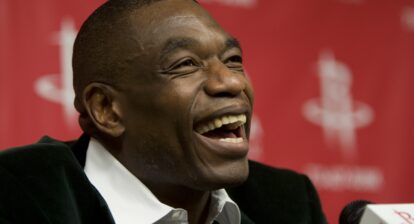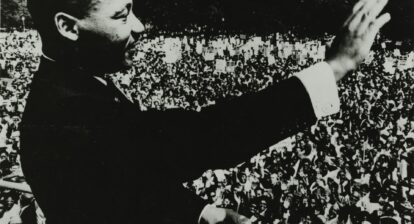
Boy stop all that crying! Men ain’t supposed to cry!
A Black man can’t show weakness, otherwise white folks will take advantage of you.
I ain’t raising no punk.
Many Black men, particularly those of a certain age, know these codes––the rules handed to us by our daddies, cousins and aunties that were reinforced by culture. For a long time, all the models for acceptable expressions of manhood––athletes, rappers, businessmen, politicians and movie stars––co-signed what they told us: Black men aren’t supposed to be soft.
That’s why seeing Randall Pearson, the strong-and-sensitive father Sterling K. Brown played for six seasons on This Is Us, having anxiety attacks or straight-up ugly crying looked like a radical leap forward. On the surface, Randall looked every bit the portrait of an idealized Black man: fit, fine, crushing it at work, great with his daughters, devoted to his equally awesome Black wife.
What made Randall revolutionary wasn’t that he was “still” a strong Black man in spite of his vulnerabilities: Randall, viewers understood, was strong because he could be vulnerable. Brown’s superb portrayal––which won him a Best Actor Emmy and Golden Globe, the first brother to win either in decades––shattered the ridiculous and harmful belief that “real” Black men don’t feel grief, worry or sorrow. We saw a whole human.
Brown has understandably not played a similar character since, but every role he’s chosen in the relatively short span of time he’s been an A-list actor continues to refute old models of masculinity so many of us inherited.
As Christopher Darden, the prosecutor who tried and failed to convict the antihero in The People v O.J. Simpson: American Crime Story, Brown made us empathetic to the anguish of a man being suffocated by the power of celebrity and assailed by his own community (Brown won an Emmy for that one, too). In the indie film Waves, he stunned audiences and critics playing a stern father demanding Black excellence from his children who later dissolves into heartbreak after a tragedy.
Brown won his first Oscar nomination for playing a newly out gay man––a part many straight Black actors still won’t dare touch––in American Fiction, giving Clifford humanity and depth. Even as a stone-faced villain, as Brown was in Black Panther playing the turncoat N’Jobu, Brown somehow managed to convey our universal need to be understood and loved; we hated his actions, but we understood his motivations––a testament to the ferocity and softness Brown has balanced in every role.
Most recently, as the head of the Secret Service in Hulu’s hit drama Paradise, Brown is a fierce warrior: a gun-toting, hand-to-hand combat-trained operative who, on the job anyway, is more machine than man. Yet Xavier Collins is also a husband and a doting father, gentle as he is firm with his babies. By the end of the first season, we’ve seen him take a bullet for the president, and kill people without flinching. Yet when reunited with his children, comforting them as the world burns around them, Xavier sobs. He doesn’t try to be cool; he doesn’t tell them to suck it up: he holds his children and weeps. Like a real man would.



